Green Threads
Green Threads: Sustainability Across the Curriculum
Sustainability in the Classroom
UofL's Green Threads Program Reaches Over 100 Faculty (8/16/23)
Green Threads workshop offers opportunity to weave sustainability into the classroom (UofL News 3/2/17)
Learn about 2024 Green Threader, Amanda Lacey's experience Weaving Green Threads into the Teaching Profession
Read about the experiences of 2009 Green Threader, Fine Arts Professor Ying Kit Chan
2025 Green Threads Faculty Cohort weaves sustainability into the curriculum across many disciplines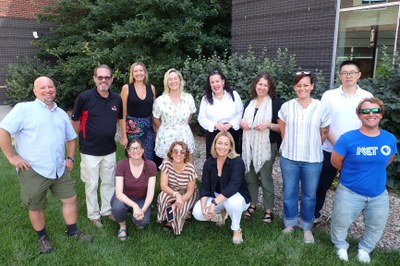
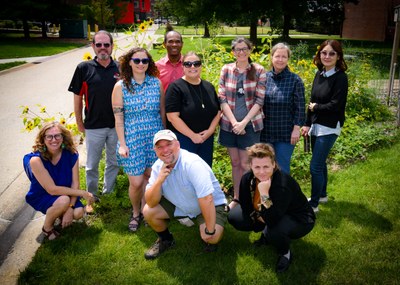
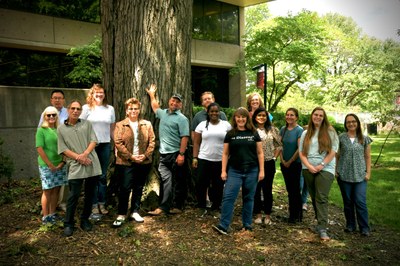
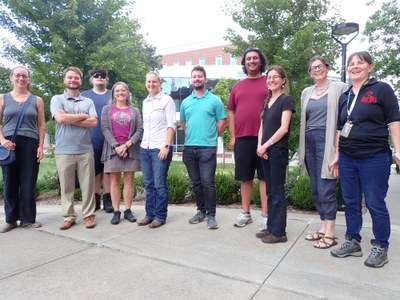
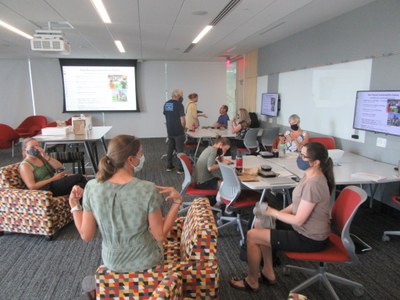
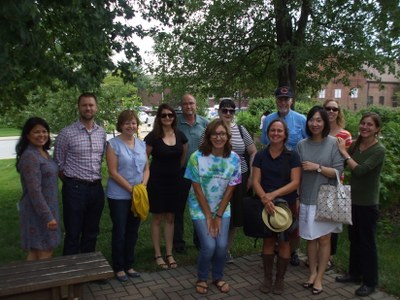
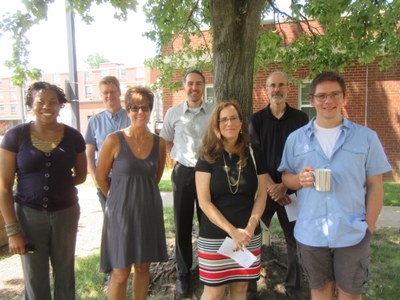
Green Threads is an annual workshop and cohort open to all UofL faculty and GTA Academy participants organized by the Sustainability Council's Education & Research Committee. The program is designed to expose faculty to sustainability issues and to help them weave sustainability themes into existing courses or to create new courses with sustainability content. Over 115 UofL professors have participated since the program launched in 2009.
Applications for 2026 are due by March 18, 2026. Download the application here.
Green Tapestries is an extension of our original program that was added in 2019 to link Green Threads alumni, new participants, and their courses through collaborative teaching. Participants identify a collaborator and a collaborative teaching project (e.g., course module or team-taught course), which they plan to develop with at least one other Green Threads alumni or new participant. Green Tapestries participants receive individualized attention and resources for their collaborative project.
Participants receive inspiration, resources, and mutual support. Incentives also include an honorarium of $500, a series of workshops including tours, meals, and resource materials on sustainability. Download the 2026 application. Contact: Brent Fryrear (502) 852-8854.
Invitation to Participate
Are you interested in sustainability issues related to environmental, social, and economic stewardship? Are you thinking of adapting a course to incorporate such concerns or creating a new course to focus on issues of sustainability? If so, we invite you to participate in Green Threads: Sustainability across the Curriculum. This faculty development workshop, sponsored by UofL’s Sustainability Council, has been run annually since 2009. We begin recruiting a new group of participants each spring.
Green Threads is a one-day workshop held just after the spring semester, or just prior to the fall semester, with a follow-up reunion for all alumni held in early December.
This workshop is open to part-time and non-tenure-track faculty, as well as GTA Academy participants!
The Sustainability Council invites full- & part-time faculty as well as GTA Academy participants from all disciplines to participate in the Green Threads workshop. The process of bringing faculty together to discuss sustainability across the curriculum was pioneered at Northern Arizona University (Ponderosa Project) and Emory University (Piedmont Project). Their approach garnered national attention for engaging faculty in collegial experiences leading to curricular change and the Piedmont/Ponderosa Model of Faculty Development is what we've used to design Green Threads. In this workshop, we will explore a variety of ways to embed issues of sustainability into the curriculum and into our classrooms.
Green Threads is an all-day workshop that is typically held on the Friday before the start of the Fall semester. Participants receive an honorarium of $500 (for UofL professors only), information on local and regional sustainability issues, local sustainability tours, and resource materials. Previous participants have evaluated this workshop as intellectually stimulating, exciting, and providing a valuable new network of faculty interested in sustainability from across the disciplines!
Workshop Applications: Applications for 2026 are due by March 18, 2026. Please submit an application with your department Chair’s approval that includes a description of how you’re considering changing an existing course or the new course you’d like to develop to Brent Fryrear (502) 852-8854. Download the 2026 application.
Green Threads participants (new applicants) must agree to:
- Participate in the day-long workshop, from 8:30am – 4pm.
- Read a brief packet of educational materials on sustainability education prior to the workshop.
- Submit a syllabus for the revised/new course and a paragraph describing your proposed course development.
- Attend the Green Threads Reunion and Celebration gathering at the end of the year (typically early December) to report back to the group on progress with a presentation.
Green Tapestries participants (Green Threads alumni, or sponsored applicant) must agree to:
- Identify at least one collaborator (alumni or new participant). You will submit the application jointly. Describe your roles and contributions to the joint project (in the brief proposal).
- Submit a brief 1-page proposal describing the joint teaching activity (e.g., course module, team teaching course) that you wish to develop with your collaborator, and timeline.
- Participate in the day-long workshop, with your collaborator and Green Threads participants.
- Read a brief packet of educational materials, relevant to collaborative teaching in sustainability.
- Attend the Green Threads Reunion and Celebration gathering at the end of the year.
We look forward to hearing from you!
Best,
Brent Fryrear, Chair, UofL Sustainability Council, and Director, Partnership for a Green City
Justin Mog, Assistant to the Provost on Sustainability Initiatives
Note: We also encourage faculty to participate in the Office of Community Engagement's complementary annual Community-Based Learning Institute, a three half-day program designed to assist faculty in developing a new community-based learning course or modify an existing course to include a service-learning component. At the end of the three days, you will have ideas and plans for your course to give you a jump start for the next semester. Learn more.
All education is environmental education. By what is included or excluded we teach students that they are part of or apart from the natural world... No student should graduate without understanding how to analyze resource flows and without the opportunity to participate in the creation of real solutions to real problems.
- David Orr "What is Education for?"
Green Threads Faculty Alumni & Guest Lecturer Pool
Those who have gone through the Green Threads program come from many disciplines and are great people to ask about weaving themes of sustainability into your courses. Many have also offered to guest lecturer in your classes on the topics listed below. Feel free to contact them directly for help. Green Threaders include:
| Name | GT Year | Unit | Department | Willing to Guest Lecture on these topics: |
|---|---|---|---|---|
| Cara Snyder | 2025 | A&S | Women's, Gender, and Sexuality Studies; Latin American and Latino Studies | |
| Lesley Harris | 2025 | Kent | Social Work | community-based participatory action research youth participatory action research arts-based methods social work research on environmental justice creating art with recycled materials photovoice |
| Kristie Ennis | 2025 | A&S | English | |
| Jonetta Weber | 2025 | A&S & CEHD | Sociology; Sport Administration | |
| Emily Denton | 2025 | A&S | Comparative Humanities | |
| Aaron Ellis | 2025 | A&S | Communication | |
| Simona Bertacco | 2025 | A&S | Comparative Humanities | |
| Brian Yueshuai He | 2025 | Speed | Civil and Environmental Engineering | |
| Mollie Weisberg | 2025 | A&S | Art & Design | |
| Trysh Wahlig | 2024 | A&S | Art & Design | |
| Jeeson Oh | 2024 | A&S | Urban & Public Affairs | |
| Ruth Dike | 2024 | A&S | Anthropology | |
| Amanda Lacey | 2024 | CEHD | Elementary, Middle & Secondary Teacher Education | |
| Robin Frederick | 2024 | A&S | Urban & Public Affairs | |
| Katherine Cox | 2023 | A&S | Art & Design | |
| Tami Harbolt | 2023 | A&S | Women's, Gender and Sexuality Studies | 1. Women and the Environmental movement 2. Sustainability and pet keeping 3. Animal sheltering and its environmental impact (public health) 4. Climate change and animal consumption 5. Dog bite prevention (public health) 6. WAGS Pet Therapy |
| Laura Krauser | 2023 | A&S | Geography & Environmental Sciences | Sustainability-related mapping and spatial data |
| Sherri Brown | 2023 | CEHD | Special Education, Early Childhood & Prevention Science |
|
| Jasmine Whiteside | 2023 | A&S | Sociology | |
| Tharshikka Vickneswaran | 2023 | Engineering | Civil & Environmental Engineering | |
| Charlie Zhang | 2023 | A&S | Geography & Environmental Sciences | Sustainability in the built environment and UN Sustainable Development Goals |
| Jeffery Masters | 2023 | A&S | Biology | Native species and ecological functions. Community science. |
| Rachel Pigg | 2023 | A&S | Biology | |
| Joseph Turner | 2023 | A&S | English | |
| Amy Lawyer | 2022 | Business | Management / Equine Industry Program | |
| James Richie | 2022 | A&S | Comparative Humanities | |
| Derek Carpenter | 2022 | A&S | Comparative Humanities | |
| Mark Mattes | 2022 | A&S | English | |
| Tyler Mahoney | 2022 | Engineering | Civil & Environmental Engineering | |
| Susan Rhema | 2022 | Kent | Social Work | |
| Stephanie Grace Prost | 2022 | Kent | Social Work | |
| Terri Burch | 2022 | Business | Equine Industry Program | |
| Megan Poole | 2021 | A&S | English | |
| Kristi Maxwell | 2021 | A&S | English | |
| Eve Carlisle Polley | 2021 & 2022 | A&S | Philosophy; Humanities | |
| Andrea Gaughan | 2021 | A&S | Geography & Environmental Sciences | |
| Jennifer Potochnic | 2020 | Music | Music | |
| Glenn “Boomer” Trujillo | 2020 | A&S | Philosophy | |
| Angela Storey | 2020 | A&S | Anthropology | |
| David Wicks | 2020 | A&S | Honors | The Ohio River, water quality, paddle sports, Ohio River Recreational Trail |
| Cooper Day | 2020 | Business / A&S | Rhetoric & Composition | |
| Mina Kwon | 2019 | Business | Marketing | |
| Katina Lee Kulow | 2019 | Business | Marketing | |
| (William) Paul McKinney | 2019 | SPHIS | Health Promotion & Behavioral Science | |
| Ellen Brehob | 2018 | Engineering | Mechanical Engineering | |
| Kyoungmee (Kate) Byun | 2018 | A&S | Art & Design | (left UofL) |
| Amy Clukey | 2018 & 2019 | A&S | English | |
| Susan Grammer | 2018 | Dentistry | Oral Health & Rehab | |
| Kelly Kinahan | 2018 | A&S | Urban & Public Affairs | (left UofL) |
| Steve Kendra | 2018 | Business | Computer Information Systems | |
| Lavina Myers | 2018 | Dentistry | Oral Health & Rehab | |
| Rachel Singel | 2018, 2019, 2021, 2022, 2023 & 2024 | A&S | Art & Design | Sustainable, non-toxic printmaking & paper-making |
| Tamara Sluss | 2018 & 2019 | SIGS, A&S | Interdisciplinary Masters in Sustainability, Urban & Public Affairs | |
| Joshua Spurgeon | 2018 | Engineering | Chemical Engineering, Conn Center | |
| Daniela Terson de Paleville | 2018 | CEHD | Health & Sport Science | |
| Russ Vandenbroucke | 2018 | A&S | Theatre Arts | |
| David Dubofsky | 2017 | Business | Finance | (emeritus) |
| Eileen Estes | 2017 | CEHD | Counseling and Human Development | |
| Per Fredriksson | 2017 | Business | Economics | Environmental economics |
| Carol Stellino-Smith | 2017 | CEHD | Early Childhood and Elementary Education | |
| Sheron Mark | 2017 | CEHD | Middle and Secondary Education | |
| Nick Paliewicz | 2017 | A&S | Communication | |
| Lynda Mercer |
2016 | A&S | Humanities | |
| Ying (Julie) Huang | 2016 | Business | Accountancy | |
| Melissa Merry |
2016 | A&S | Political Science | Environmental Policy |
| Karen Kayser | 2016 | Kent | Social Work | Cancer disparities & the environment |
| David Buckley | 2015 | A&S | Political Science | |
| Daniel Decaro | 2015 | A&S; Law | Urban & Public Affairs; Psychological & Brain Sciences; Law | 1. Environmental governance; Water governance 2. Public participation 3. Environmental decision-making & psychology 4. Cooperation; Community-based environmental governance; Social dilemmas |
| Linda Fuselier | 2015 | A&S | Biology | |
| Nisha Gupta | 2015 | Delphi/i2a; A&S | Peace, Justice, and Conflict Transformation | (left UofL) |
| Sarah Miller | 2015 | A&S | Communication | |
| Benjamin Leamon | 2015 | A&S | Political Science; Urban & Public Affairs | (left UofL) |
| Mark Running | 2015 | A&S | Biology | |
| Jeneen Wiche | 2015 | A&S | Anthropology | |
| Wei Song |
2014 | A&S | Geography & Environmental Sciences | |
| Christopher Fulton | 2014 | A&S | Art & Design | |
| Carol Stinson O'Neal | 2014 | CEHD | Health & Sports Sciences | |
| Sherri Wallace | 2014 | A&S | Political Science | |
| Brian Barnes | 2014 | A&S | Philosophy/Business | |
| Dave Simpson | 2012 | A&S | Urban & Public Affairs | (left UofL) |
| Ingrid Weiland | 2012 | CEHD | Teaching & Learning | (left UofL) |
| Jianhua Zhao | 2012 | A&S | Anthropology | |
| Mary Ashlock | 2012 | A&S | Communication | |
| Paul Salmon | 2012 & 2009 | A&S | Psychological & Brain Sciences | |
| Scott LaJoie | 2012 | SPHIS | Health Promotion & Behavioral Science | |
| Selene Phillips | 2012 | A&S | Communication | |
| Sharon Moore | 2012 | Kent | Social Work | |
| Harry Pickens | 2011 | A&S | Honors | (left UofL) |
| Jessica McCarty | 2011 | A&S | Geography & Environmental Sciences | (left UofL) |
| Kristi King | 2011 & 2021 | CEHD | Health & Sport Science | Physical activity & public health |
| Margath Walker | 2011 | A&S | Geography & Environmental Sciences | |
| Sharon Kerrick | 2011 | Business | Entrepreneurship | (left UofL) |
| Bob Carini | 2010 | A&S | Sociology | |
| Frank Goetzke | 2010 | A&S | Urban & Public Affairs | |
| John Cross | 2010 | Law | Law | |
| Kathleen Bean | 2010 | Law | Law | |
| Roman Yampolskiy | 2010 | Engineering | Electrical & Computer Engineering | Artificial intelligence and the role of digital technology in sustainability |
| Sumei Zhang | 2010 | A&S | Urban & Public Affairs | Sustainable cities - urban planning, transportation, etc. |
| Tamara Yohannes | 2010 | A&S | English | (left UofL) |
| Terry Edwards | 2010 | A&S | Justice Administration | |
| Cate Fosl | 2009 | A&S | Women's & Gender Studies | |
| Clara Leuthart (emeritus) | 2009 | A&S | Geography & Environmental Sciences | (emeritus) |
| Geoff Cobourn | 2009 | Engineering | Mechanical Engineering | |
| Jonathan Haws | 2009 | A&S | Anthropology | |
| Kathy Rudasill | 2009 | CEHD | Educational & Counseling Psychology | (left UofL) |
| Keith Lyle | 2009 | A&S | Psychological & Brain Sciences | cognitive biases in information processing |
| Lauren Heberle | 2009 | A&S | Sociology | |
| Mehmed Kantardzic | 2009 | Engineering | Computer Engineering & Computer Science | |
| Moon Baik | 2009 | A&S | Art & Design | (emeritus) |
| Nan-Ting Chou | 2009 | Business | Economics | |
| Pat Cerrito | 2009 | A&S | Mathematics | (left UofL) |
| Sarah Emery | 2009 | A&S | Biology | Restoration ecology; invasive species; perennial bioenergy; plant biology; agricultural ecology; prairie/grassland restoration; soil ecology; Great Lakes ecosystems (20-60 min. depending on needs) |
| Sheri Moore (emeritus) | 2009 | CEHD | Teaching & Learning | (emeritus) |
| Suraj Alexander | 2009 | Engineering | Industrial Engineering | |
| Ying Kit Chan | 2009 | A&S | Art & Design | |
|
Russ Barnett (emeritus) |
Organizer | EVPRI | Envirome Institute | (emeritus) 1. Sustainability at UofL, in Louisville, or in KY 2. Environmental justice 3. Air & water quality 4. Citizen science (environmental monitoring) |
|
Margaret Carreiro (emeritus) |
Organizer | A&S | Biology | (emeritus) |
| Justin Mog | Organizer | Provost's Office | Assistant to the Provost for Sustainability Initiatives | 1. Campus Sustainability Tours 2. Sustainability initiatives at UofL 3. Individual and group actions for sustainability 4. UofL greenhouse gas emissions & Climate Action Plan 5. Car-free living & safe cycling |
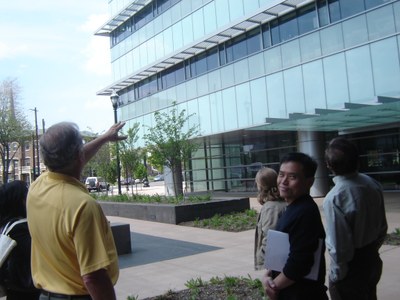
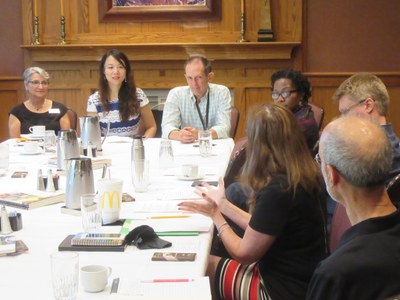

Resources for Teaching about Sustainability
- UofL's EcoReps Program - provides a series of short online training videos and supplementary readings on a variety of sustainability topics which can easily be incorporated into courses. The program also offers a certification program and service opportunities for students, faculty, and staff.
- Campus and Course Conversations - an adaptation of Living Room Conversations that offers a practical and powerful approach to support the rising spirit of citizens coming together, outside of the partisan bickering, to create new relationships, to spark opportunities and to encourage sustained engagement to address local and national challenges.
- Sustainability Education & Economic Development (SEED) Center - offers an online resource center featuring curricular materials and more. Organized around 7 sectors: Solar, Wind, Green Building, Energy Efficiency, Sustainable Agriculture/Food/Land, Transportation&Fuels, Clean Tech, and Sustainability Education.
- Climate, Adaptation, Mitigation, E-Learning (CAMEL) - A free, comprehensive, interdisciplinary, multi-media online resource of credible content and curricular tools to help educators more effectively teach about climate change.
- Giving assignments in sustainability to your students? Check out these Key Components of Quality Sustainability Assignments - focus on solutions and systemic change, rather than disempowering "doom and gloom." Make the work relevant to the skills of being change managers (key sustainability learning outcomes). Evaluate your students using the International Sustainability Literacy Test to measure knowledge of sustainability issues and the skills required to make change.
-
Interested in Campus As A Living Lab projects?AASHE's Guide for Applied Sustainability Learning Projects: Advancing sustainability outcomes on campus and in the communityprovides a step-by-step framework for how applied learning for sustainability programs can be designed, built and scaled around two interconnected goals:
- Provide students with exceptional learning experiences in sustainability;
- Contribute to workable solutions that support tangible sustainability outcomes on campus and the surrounding community.
- Disciplinary Associations Network for Sustainability (DANS) and the Higher Education Associations Sustainability Consortium (HEASC) have created the Sustainability Learning at Colleges and Universities discussion forum where you can post questions, discuss ideas, and get insights from colleagues around the world.
- Sustainability Improves Student Learning (SISL) - a select group of academic associations/disciplinary societies working together to increase students’ learning in undergraduate courses, and better prepare students for the 21st-century big questions that relate to real-world challenges such as energy, air and water quality, and climate change. Here you will find helpful teaching resources and information on workshops and events.
- Teaching Environmental Justice – Teaching and learning about Environmental Justice – a clearinghouse of resources.
- Zinn Education Project – Teach Climate Justice Campaign – primarily targeted at K-12, but many of these resources can be adapted for use in higher education.
- Ocean Plastics Educational Curriculum - "EPIC Academy" - Ocean Legacy Foundation's free, 10-part (beginner to advanced) curriculum series about ocean plastic, how to change the world around you and how to make a difference in your community to end plastic pollution. Learn practical tools that have been developed over decades of experience by leading experts.
- Check out our Links page for more great online resources to engage your students and to make teaching about sustainability issues easy and fun. Topics include:
1. Tools & Footprint Calculators which can be used for assignments and demonstrations;
2. Local Organizations engaged in sustainability which may provide guest speakers or service learning opportunities;
3. News, Articles & Stories covering the pressing sustainability issues of our time in all forms of media;
4. Climate Change & Energy related resources;
5. Economy resources that explore what a more justice, sustainable economy might look like;
5. Food related sites that make connections between food, health, economy, justice, and environment;
6. Products & Services guides to local, green businesses;
7. Social Justice issues and organizations working on the social side of sustainability;
8. Sustainability at Other Kentucky Schools to find out what other schools are doing to address this issue;
9. Transportation links that help us explore how to get around with lower impact
10. Understanding Sustainability links to help provide the bigger picture; and
11. Waste & Recycling resources for improved handling of solid waste.
Sustainability Course Books Available
The Education & Research committee has acquired the full set of excellent course books produced by the Northwest Earth Institute and is eager to loan them out to anyone at UofL interested in weaving sustainability into their courses or educational events. To borrow the books, contact Justin Mog at 502-852-8575 or justin.mog (at) louisville.edu and leave your campus mail address. Course books available include:
VOLUNTARY SIMPLICITY
This course explores the personal and environmental benefits of simplicity. Topics covered include: The Meaning of Simplicity ♦ Living With Less ♦ Making a Living ♦ Do You Have the Time? ♦ Living Simply on Earth ♦ Celebration & Call to Action
DISCOVERING A SENSE OF PLACE
This course considers the potential benefits of knowing and protecting our place. Will a commitment to the local bioregion affect our willingness to accept responsibility to care for the Earth? Topics covered include: A Sense of Place ♦ Responsibility to Place ♦ Knowing Your Bioregion ♦ Living in Place ♦ Mapping Your Place ♦ Building Local Community ♦ Empowerment ♦ Celebration & Call to Action
CHOICES FOR SUSTAINABLE LIVING
Each of us makes choices that have an impact on the Earth. In this course, learn about which options are more sustainable than others. Topics covered include: A Call to Sustainability ♦ Ecological Principles ♦ Food ♦ Buying ♦ Communities ♦ Business and Economy ♦ Visions of Sustainability ♦ Celebration & Call to Action
MENU FOR THE FUTURE
This course explores food systems and their impacts on culture, society and ecological systems. Participants will gain insight into agricultural and individual practices that promote personal and ecological well-being. Topics covered include: What’s Eating America ♦ Anonymous Food ♦ Farming for the Future ♦ You Are What You Eat ♦ Towards a Just Food System ♦ Choices for Change ♦ Celebration & Call to Action
HEALTHY CHILDREN—HEALTHY PLANET
This course explores the influence our fast-paced, consumer-oriented society has on children, and how families can deal with these influences. Topics covered include: Cultural Pressures ♦ Family Rituals and Celebrations ♦ Advertising ♦ Food and Health ♦ Time and Creativity ♦ Technology and the Media ♦ Exploring Nature ♦ Celebration & Call to Action
GLOBAL WARMING: CHANGING CO2URSE
Learn more about the history and science of global warming. Explore personal values and habits as they relate to climate change and consider actions to curb global warming. Topics covered include: Off Course ♦ Collision Course ♦ Changing Course ♦ Setting a New Course ♦ Celebration & Call to Action
SUSTAINABLE SYSTEMS AT WORK
This five session course for the workplace is designed to further organizational sustainability initiatives. Session topics include: Seeing the Big Picture ♦ Taking a Closer Look ♦ Framing Sustainability ♦ Seeing It Through ♦ Focusing on Action
A WORLD OF HEALTH: CONNECTING PEOPLE, PLACE, AND PLANET
A six-session discussion guide that explores "good health," the connections between human health and the environment, and how we can sustain both. Session topics include: Redefining Health ♦ Eating Well ♦ Building Healthy Communities ♦ Curing Consumption ♦ Healthy Planet-Healthy People
RECONNECTING WITH EARTH
A six-session course addressing core values and how they affect the way we view and treat the Earth. This discussion course is designed to: clarify values through discussions about our relationship to Earth; discover how personal beliefs and values affect the way we view and treat the earth; and explore what it means to take personal responsibility for Earth. Session topics include: Wild Nature ♦ Shifting Paradigms ♦ Nature and Spirit ♦ The Universe Story ♦ Ecopsychology ♦ Bringing it Down to Earth
JUST BELOW THE SURFACE: PERSPECTIVES ON THE GULF COAST OIL SPILL
A one session discussion guide that explores the connections between Deepwater Horizon, energy policies and our lifestyles. The course offers an opportunity to reflect further on this historical event and the lessons it holds for us moving forward—individually and collectively. The intent is not to assign blame, but rather to take responsibility—as conscious consumers and concerned, active citizens.



